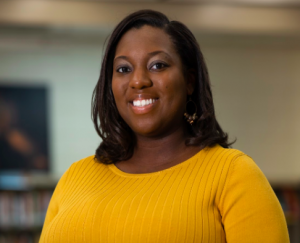By: Elizabeth McCauley McDonald, South Carolina Elementary School Principal
The Challenge
I still remember the moment a teacher walked “Marco” to my classroom. I went to say hello and he said, “Hola.” As he entered the room and had a seat, the teacher whispered to me, “he doesn’t speak English.” I remember the feeling in the pit of my stomach, because I was terrified. I took three years of Spanish in high school and one semester in college, but I could only remember a few words and phrases. Conjugating a verb would have been a miracle! I instantly began to panic because I did not know how I was going to help a student I could only communicate with in broken phrases. Immediately, I did what most first year teachers would probably do…I looked in my class, found my only other Latinx student in the classroom and asked her to help me communicate with Marco. He was in my classroom for approximately three months before he moved away and in the short three months of being in my classroom, he transformed my teaching practices.
While I know that my instructional practices with Marco were not the most useful or the best practices, he always walked in my class with a smile and was willing to allow me to practice my Spanish with him. See, Marco was fluent in Spanish and could read in Spanish. He was a highly intelligent student, and even with the language difference, he often outperformed half of my English only students. In that short three month period, I saw Marco step out of his comfort zone, in small group settings, and practice speaking English with his peers. When we worked together one-on-one, I would attempt to speak Spanish and he would practice English. When we just couldn’t connect the dots between the two languages, he began to call for the student in class that spoke both languages to translate – he became his own advocate.
I saw Marco for who he was and I valued his language and his culture which created an environment where he felt comfortable enough to practice English out loud. He went from being unwilling to speak a word to anyone in the classroom, except me, to actively engaging with his peers. As he became more vocal, more of his English only speaking peers began to engage with him and embrace his language and want to learn Spanish as well. In all honesty, to me those moments were magical. My English only students seemed to realize that Marco was not behind, or not as smart as them, simply because he spoke a different language and English with a thick accent; instead, they heard beyond the accent and saw Marco for who he was, someone who was extremely knowledgeable, smart and an emerging bilingual. My English only students wanted to also be able to speak two languages.

Everyone noticed when Marco stopped coming to class. He and his family moved to California. While, I most certainly did the best I could – speaking slowly, using visual pictures and my hands to describe words, encouraging collaboration with peers and one-on-one conversations with me, providing tests in Spanish (thank you Google Translate), I can only imagine how much more I could have done for Marco if he was in my class after I gained my ESOL certification, or even after I had taken one ESOL course.
Lessons Learned
While I met Marco in my first year teaching, there are a few lessons that I have kept close with me from that experience.
Allow students space to use their first language on their journey to acquire a second language.

Can you imagine an English only speaking student enters their ninth grade French course for the first time and the teacher tells them they are only allowed to speak French, which they do not know yet, and the teacher only speaks to them in French? Most parents would be in an uproar because the students do not have foundational knowledge of the language, language structure, or language vocabulary, but they are being held to a standard of fluency and proficiency. But, yet and still, we ask emergent bilingual students to do that each and every day. Instead of allowing them to use their language as a bridge, we expect them to make a leap across uncharted territory into the unknown, without support. This has to stop!
Allow students to use resources in their first language.
One thing that was abundantly clear, is that Marco could read and speak Spanish fluently. Many of our emergent bilingual students are coming to school with skills in their first language, but how often do we, as educators, leverage that knowledge? Through the use of Google translate, I was able to allow Marco to complete his assessments in his dominant language. I would provide Marco with the English and Spanish versions of his tests and quizzes. If Marco stayed longer, I would have tried to phase our usage of the Spanish document as a support and supplement, if he was ready for it. In fact, I once taught a German exchange student, and we were able to do just that. Allow students to show you who they are and what they can do. Support them in the continued development of their first language as they acquire English. Show interest in their language, learn what you can so that you can communicate with your student in their language of comfort, before you require them to stretch to yours.
Now, I know what some folks are thinking, but what about the state assessments that require the usage of English? Well, that’s why you have to continue the work and continue to support your emergent bilinguals in their English development. I think we could also argue that assessments given to emergent bilinguals in a language other than their first language, especially when they can read and write in their first language is problematic, but that would be a whole other blog post.
The designation of a student as an English language learner or emergent bilingual has no bearing on a student’s intelligence.
Too often, educators are surprised when students like Marco perform well on assessments and can understand and analyze content. The ability to speak more than one language is often seen as a value added when the first language is English and the second language is… well, not English. Too often we see students who speak two languages, but due to their primary language being a language other than English, it is seen as a deficit. This has to stop! Linguistic prejudice and linguistic racism is real and we all must do the work to self-identify the language biases we hold, and we must do that work ourselves. Furthermore, we need to see all emergent bilingual students as walking into our classrooms with additional knowledge, and that should not be determined based on the geographic location associated with their first language.
Into the Beyond

As students enter the classrooms in our school buildings this year, I’m calling for all educators to work on leveraging the funds of knowledge students bring with them to school each and every day. Leverage the language and the cultural practices that create the foundations on which students build their understanding. Support student development of their first language, in addition to supporting their development of English. Most of all, seek to understand your students, and not just to have your students understand you. It’s only at this point that we can move into the beyond, beyond listening to just the accent, beyond preconceived ideas of what it means for a student to be an emergent bilingual, and we can begin to center our students’ experiences in meaningful ways to help them process the language around them.
About the Author

Elizabeth McCauley McDonald is an Assistant Principal at Northside Elementary School in Seneca, South Carolina. She holds a Bachelor’s in Secondary Social Studies from Clemson University, a Masters in Education from Anderson University and a Masters in Educational Administration from the University of South Carolina. Elizabeth is currently pursuing a PhD. in Literacy, Language and Culture at Clemson University. Elizabeth also serves as the LiD 6-12 Blog Editor.

